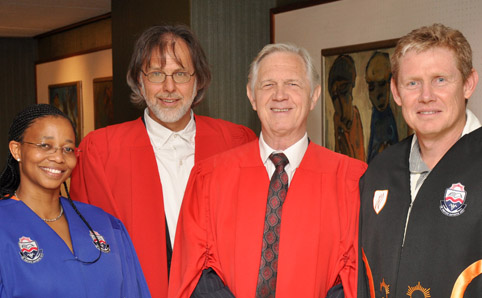Latest News Archive
Please select Category, Year, and then Month to display items
17 May 2024
|
Story Anthony Mthembu
|
Photo Supplied
 Prof Magdalena Sobon from Poland and Michael Jackson Blebo from Ghana shared their expertise with staff and students during their visit to the Department of Fine Arts at the University of the Free State.
Prof Magdalena Sobon from Poland and Michael Jackson Blebo from Ghana shared their expertise with staff and students during their visit to the Department of Fine Arts at the University of the Free State.
In a concerted effort to solidify its identity in South Africa and abroad, the Department of Fine Arts at the University of the Free State (UFS) recently played host to two distinguished artists: Prof Magdalena Sobon from the Wladyslaw Strzeminski Academy of Fine Arts in Lodz, and the Ghanaian multidisciplinary artist, Michael Jackson Blebo.
Dr Adelheid Von Maltitz, Senior Lecturer in the Department of Fine Arts at UFS, lauded the visits, held between 19 and 29 March 2024, as an enriching learning experience for the faculty and students within the department.
The visit highlights
During their visit to UFS, Prof Sobon and Blebo actively engaged with the department’s staff and students. Prof Sobon, an acknowledged paper-making artist, conducted a comprehensive two-day workshop, imparting extensive knowledge in this craft. As a direct outcome of this workshop, the department has procured the requisite equipment and materials, enriching the students’ capabilities in this medium. Blebo on the other hand, conducted a demonstration on clay bust modelling and both artists participated in critique sessions with the fourth-year students. Dr Von Maltitz underlined the significance of Blebo’s African heritage, noting, ‘’For our students to interact with a young, accomplished artist of his calibre is of benefit to them in terms of how they may envision their art careers.’’ Of particular note were Prof Sobon’s interactions with the students, wherein she shared her own artistic practices from her student years during her lectures.
In addition to their engagements with the students, Prof Sobon and Blebo also had the opportunity to present their research to second-year sculpture students at the Richmond Land Art Project, an off-campus initiative fostering art creation centred on socio-economic and other pertinent issues.
Future collaborations
Dr Von Maltitz emphasised the importance of maintaining ties with these eminent artists for the department’s growth and global outreach. Prof Sobon’s visit has paved the way for two department members to visit the Wladyslaw Strzeminski Academy of Fine Arts in Lodz in the near future. ‘’These individuals will get an opportunity to learn about studio setups and network with fellow academics, creative researchers, and artists,’’ stated Dr Von Maltitz. She hailed the visit by the two artists as both stimulating and fruitful, particularly for the students.
Professor suggests San place-name book
2011-09-28
|

|
At the inaugural lecture of Prof. Raper were, from left to right: Dr Choice Makhetha, Vice-Rector: External Relations (actg); Prof. Theo du Plessis, head of our Department of Language Management and Language Practice; Prof. Raper; and Prof. Lucius Botes, Dean of our Faculty of Humanities.
Photo: Stephen Collett
|
Prof. Peter Raper, Honorary Professor: Linguistics, in the Department of Language Management and Language Practice at our university, delivered his inaugural lecture on Tuesday, 27 September 2011. Prof. Raper focused on the topic of “Interpretations and translations of Bushman (San) place names” and he recommended the establishment of a chair for Khoikhoi and Bushman name studies at the UFS. Prof. Raper said that, until about 2 000 years ago, the Bushmen and their ancestors were the only inhabitants of southern Africa and that, presumably, all place names in the region were of Bushman origin. Prof. Raper also suggested the publication of a dictionary of Bushman place names which will contribute to restoring and preserving Bushman toponymic, linguistic and cultural heritage.
In his inaugural lecture, Prof. Raper distinguished between the terms Bushman and San. He said “the term Bushman was for a long time considered an insult and San was preferred. Recently, Bushman became preferable and San is considered an insult”.